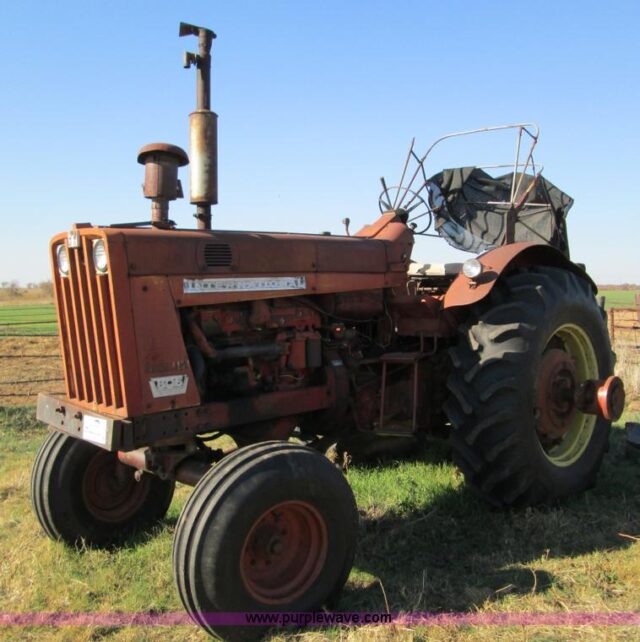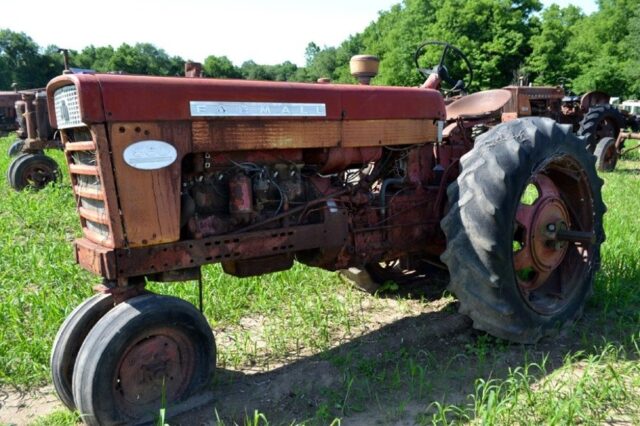Nothing to do with books, but a story that PG loved, having grown up driving tractors on farms and ranches.
From yourclassical.org:
If you ever drove down a dusty gravel road in east-central Nebraska during the late 1970s and early ’80s, you may have come across a couple of red tractors in the fields with the guys operating those tractors “air conducting.”
That would’ve been my father and me.
Our farm was 400 acres — some irrigated, some dry land — mostly corn and soybeans. No livestock except for the family dogs and the occasional cats. Every spring, right about the time school would let out in mid-May, there would be plenty of work to do. Summer vacation? Only if it rained.
My dad was a wonderful farmer. His fields always looked beautiful. I realized from an early age, “This guy really knows what he’s doing.” And while many of his colleagues were constantly updating equipment, buying bigger and better machinery, my dad kept his older stuff in tip-top shape — a 1963 International Harvester 806 and a 1960 IH 560. The red ones. Both tractors were always equipped with what my dad considered a vital instrument: a good radio. The tractor radio was the key element for the guy known to his friends as Bud Jake. To this day, I think that’s a big part of why I chose a career in radio — I grew up all around them. There were radios everywhere. But the tractor radios had to be of the highest quality, not only from a fidelity standpoint, but also able to stand up to the adverse conditions of a Nebraska summer. You see, Dad’s tractors had no cabs. They were open-air all the way. Eat my dust? Oh, we did. All the time.
There were three things Dad enjoyed listening to on the radio — a ballgame, classical music or a decent talk show. (Coincidentally, in my radio career, I’ve had the opportunity to do all three.) There’s no doubt that if the Cardinals, Royals or Twins were playing a day game and my dad was in the field, he’d find it on the radio. That was tractor-time nirvana — the ultimate. But day baseball was a treat; it just didn’t happen all that often. And that’s where classical music was the ideal pinch hitter.
Dad was a meat-and-potatoes classical guy: lots of Beethoven, Mozart, Bach, Haydn, Brahms and Handel; those were his composers of choice. Occasionally though, he’d drop a little salsa on that plate of classical fare. For instance, I can remember seeing an old copy of Stravinsky’s Rite of Spring in his record collection. Dad also had a fondness for Nikolai Rimsky-Korsakov, specifically his Scheherazade. He once heard an announcer bungle Rimsky’s name, and from that point on, took great pleasure in referring to the Russian composer as Nikolai Rimsky-korSOCKov.
. . . .
So back to the “air conducting.”
Field work was long, dirty and monotonous. Back and forth, up and down. And when it was time to cultivate a field of corn or beans (we called it go-digging), you had to go painfully slow, making sure the equipment was digging out the weeds and not the crop! Often times, my dad and I would be working the same field — he on one end and me on the other. Back and forth. Up and down. A quarter-mile north, turn, and then a quarter-mile south. All day. There were three classical-music options on the tractor radios, but it was usually the AM public-radio station from Ames, Iowa, that came in best. As my dad and I would get closer and closer to each other, eventually meeting in the middle of the field, we would always be curious as to what the other was listening to on the radio. Being a teenager, I was all over the map, frequently turning the dial for a variety of programming. But the classical influence was certainly there, so quite often we might be listening to the same station.
Then it happened.
The day was going well, with just enough of a breeze to keep the dust away. The beans looked beautiful as my dad pulled his go-dig from north to south, with me pulling about 50 yards away, south to north. I was listening to the classical station from Ames, which was playing Brahms’ Variations on a Theme of Haydn. It was one of my dad’s favorite works. I thought to myself, “I wonder if he’s listening to this?” Right about then, I looked across the way toward my dad, headed south, and he was looking at me, conducting to the music. I started conducting back at him. Clearly, we were both dialed into the Brahms. With each pass, we continued our “air conducting,” and it kind of became a thing with us. From that day on, Dad might pass by, conducting, and across the way, I’d be listening to some pop station and think, “Hmmm, must be something good on classical,” and make the switch.
. . . .
My dad has been gone for 31 years now; he died far too early. But this time of year, when it seems you can literally see the new crops growing daily in the warm June sun, I think about him more than ever. I think about his anxiety with every storm cloud that appeared on the western horizon. I think about his devotion to making sure everything was done right, his often intense reaction when things didn’t go right, and his utter joy at watching a slow, soaking rain (with no hail or wind) giving his corn and beans a much-needed drink.
When I think of these things, there’s always a musical soundtrack playing softly in the background: Bach, Brahms, Mozart, Rimsky-Korsakov.
And the guy conducting is my dad.
Link to the rest at yourclassical.org


That’s a great story.